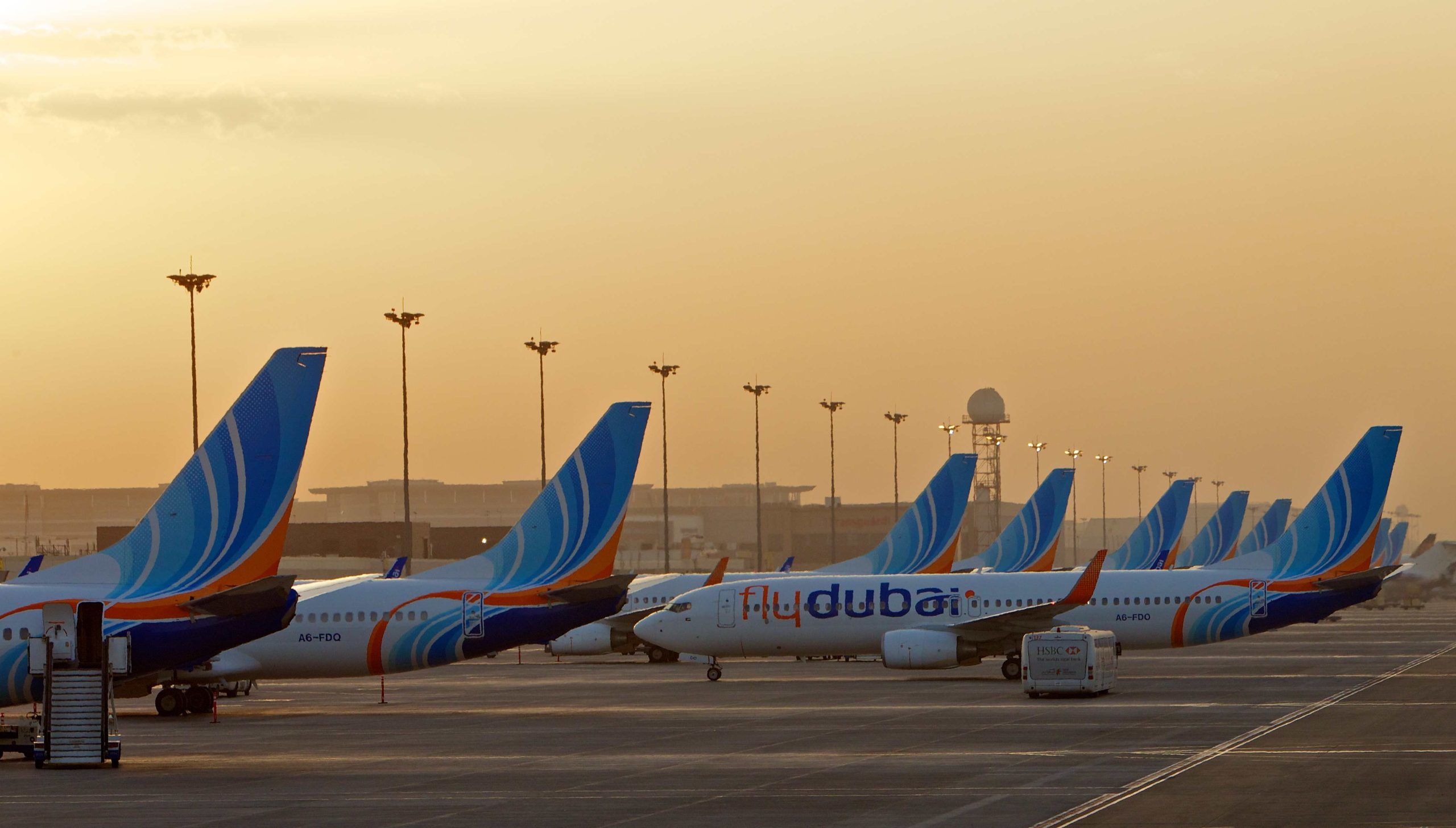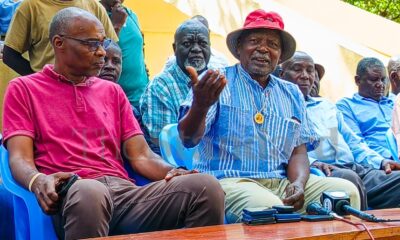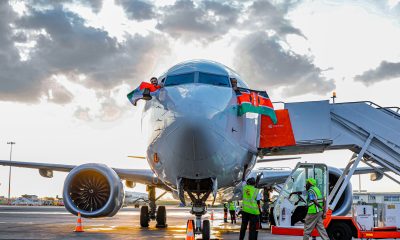News
Why FlyDubai’s Plan For Dubai-Nairobi Direct Flights Fell Flat Amid Sh100 Million Bribery Fallout

The unraveling of FlyDubai’s ambitious Nairobi expansion has exposed a sordid tale of alleged corruption that has sent shockwaves through both Kenyan aviation circles and the upper echelons of government in Nairobi, raising uncomfortable questions about how business gets done in one of East Africa’s supposedly most transparent economies.
At the heart of the scandal sits former Nairobi governor Mike Sonko, a flamboyant politician with a history of controversy, and Terry Mbaika, the Principal Secretary in charge of the state department for aviation and aerospace development.
Between them lies an alleged Ksh100 million bribery scheme that has not only scuttled FlyDubai’s route expansion but also threatened to poison diplomatic relations between Kenya and the United Arab Emirates.
The mechanics of the alleged fraud are brazen in their simplicity.
According to sources with direct knowledge of the affair, Sonko positioned himself as the critical intermediary between FlyDubai and the Kenyan bureaucracy, promising to deliver the necessary approvals for the Dubai-based carrier to commence direct flights to Jomo Kenyatta International Airport.
The airline, eager to tap into the lucrative Nairobi market, allegedly handed over Ksh100 million to Sonko to grease the wheels.
What happened next reads like a script from a corruption exposé. Sonko claims that when he approached Mbaika with FlyDubai’s request, the PS allegedly dispensed with formalities entirely.
“She didn’t ask for paperwork, she allegedly asked for Ksh100 million cash. No discussion, no shame,” a source familiar with the matter revealed.
Mbaika has vehemently denied receiving any money, though she acknowledges that Sonko did approach her regarding the airline’s interests.
The alleged payment mechanism was conducted with theatrical secrecy. Sonko maintains he agreed to an initial Ksh50 million payment, which was allegedly collected by Mbaika’s associate, businessman James Mbaluka, in four nocturnal installments at the Sheraton Hotel near JKIA, totaling approximately $400,000.
The cloak-and-dagger nature of these transactions, if true, suggests all parties understood the illegality of what was transpiring.
But competing narratives have emerged that paint an even more complex picture of double-dealing and betrayal.
According to alternative accounts, Mbaika was in Dubai on official business when Sonko and Mbaluka followed her there, arranging a meeting with FlyDubai officials.
During this encounter, the PS reportedly insisted that any application would need to follow proper procedures.
What allegedly happened next represents fraud at an audacious scale: Sonko is accused of forging a letter purporting to show that the Kenyan government had approved FlyDubai’s operations between Dubai and Nairobi.
Armed with this fabricated authorization, FlyDubai released an additional Ksh50 million to Sonko. More damagingly, the airline issued a press release to international media announcing that it would commence weekly flights to Nairobi beginning October 15th.
The announcement blindsided Kenyan aviation officials who knew nothing of such approval, triggering immediate alarm bells within the Ministry of Transport and at the Kenya Civil Aviation Authority.
The situation descended into farce when, according to Sonko’s version of events, Mbaika and Mbaluka allegedly attempted to cut him out of the arrangement entirely.
After receiving the money, the pair reportedly flew quietly to Dubai to negotiate directly with FlyDubai, seeking to claim credit and presumably additional benefits for themselves.
When Sonko followed up, he claims Mbaika feigned ignorance, denying any knowledge of cash payments.
Sonko, never one to go down without a fight, insists he possesses an arsenal of evidence: recordings of negotiations, videos of the alleged payments, and CCTV footage from the Sheraton Hotel.
He is reportedly prepared to deliver this material directly to President William Ruto, a move that would place the scandal at the very doorstep of State House.
The fallout has been immediate and severe. FlyDubai has been left humiliated, having publicly announced routes it cannot legally operate, damaging its credibility in a region where it competes fiercely with established carriers like Kenya Airways, Ethiopian Airlines, and Emirates.
The airline’s eagerness to enter the Nairobi market appears to have made it vulnerable to exploitation, raising questions about its due diligence processes when operating in jurisdictions where corruption remains endemic.
For Kenya, the scandal represents yet another black eye for a government that has pledged to root out corruption.
President Ruto came to power partly on an anti-corruption platform, but his administration has struggled to demonstrate concrete results.
The involvement of a senior Principal Secretary in such allegations undermines investor confidence in Kenya’s institutions and its stated commitment to transparent governance.
The diplomatic implications are equally troubling. Kenya has cultivated increasingly close economic ties with the UAE, with Dubai serving as a critical hub for Kenyan exports, tourism, and financial flows.
This scandal threatens to complicate those relations at a time when Kenya is seeking to diversify its international partnerships beyond traditional Western allies.
Both governments have launched investigations, though cynics in Nairobi question whether these probes will produce accountability or merely provide political cover.
Kenya’s investigative agencies have a dismal track record of successfully prosecuting high-level corruption cases, with prosecutions often collapsing due to “lack of evidence” or dragging on for years until public attention fades.
The FlyDubai debacle also highlights the persistent role of political fixers in Kenya’s economy.
Despite reforms aimed at streamlining business procedures and reducing bureaucratic discretion, powerful intermediaries like Sonko continue to operate in the shadows, promising to deliver results that supposedly legitimate processes cannot.
Their continued relevance speaks to a system where connections often trump competence and where the formal rules exist alongside informal mechanisms of power and patronage.
For international businesses eyeing opportunities in Kenya, the scandal offers a cautionary tale.
The temptation to circumvent bureaucracy through questionable channels may promise short-term results but carries enormous reputational and legal risks.
FlyDubai’s alleged willingness to engage with Sonko, regardless of whether company executives knew the full extent of his plans, demonstrates the perils of outsourcing government relations to politically connected middlemen.
As investigations proceed, the question remains whether anyone will ultimately face consequences.
Sonko, who has survived numerous scandals during his political career, appears ready to play the role of whistleblower, potentially in exchange for immunity or leniency.
Mbaika maintains her innocence, and without conclusive evidence, prosecuting a sitting Principal Secretary presents political complications for any government.
What is already clear, however, is that FlyDubai’s plans for Nairobi lie in ruins, a casualty of alleged corruption that has benefited no one except, perhaps, those who allegedly pocketed the bribes.
The airline’s competitors will quietly celebrate the removal of a potential rival, while passengers who might have benefited from increased competition and lower fares on the Dubai-Nairobi route will pay the price.
The scandal strips away the veneer of progress that Kenyan officials often tout when discussing the country’s business environment.
Behind the glossy investor presentations and pledges of reform lies a system where cash payments in hotel rooms and forged letters can still determine who gets to operate and who doesn’t.
Until that fundamental reality changes, stories like FlyDubai’s failed Nairobi gambit will continue to repeat themselves, enriching the corrupt while impoverishing the country’s reputation and its citizens’ prospects.
Kenya Insights allows guest blogging, if you want to be published on Kenya’s most authoritative and accurate blog, have an expose, news TIPS, story angles, human interest stories, drop us an email on [email protected] or via Telegram
-

 Business2 weeks ago
Business2 weeks agobetPawa Empire Crumbles: Mr Eazi’s Betting Gambit Unravels Amid Partner’s Shadowy Deals
-

 Business1 week ago
Business1 week agoMinnesota Fraud, Rice Saga, Medical Equipment Deal: Why BBS Mall Owner Abdiweli Hassan is Becoming The Face of Controversial Somali Businessman in Nairobi
-

 News1 week ago
News1 week agoDCI Probes Meridian Equator Hospital After Botched Procedure That Killed a Lawyer
-

 Politics1 week ago
Politics1 week agoYour Excellency! How Ida’s New Job Title From Ruto’s Envoy Job Is Likely to Impact Luo Politics Post Raila
-

 Investigations2 weeks ago
Investigations2 weeks agoEXPOSED: SHA Officials Approve Higher Payments for Family, Friends as Poor Patients Pay Out of Pocket
-

 Business1 day ago
Business1 day agoCooking Fuel Firm Koko Collapses After Govt Blocks Sh23bn Carbon Deal
-

 News1 week ago
News1 week agoKenya Stares At Health Catastrophe As US Abandons WHO, Threatens Billions In Disease Fighting Programmes
-

 Politics2 weeks ago
Politics2 weeks agoJaramogi Clan Tells Raila Jr, Winnie Against Disrespecting Their Uncle Oburu, Warns of Curses




















